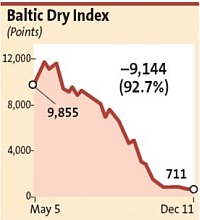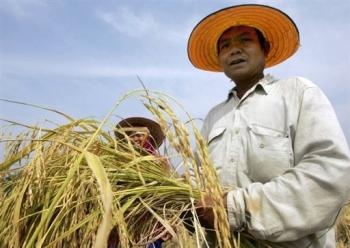Got Stored Food?
______________________________________________
Food shortages showing up worldwide with more to come very soon. How do we know food will soon be in short supply? Look at the Baltic Dry Index.
________________________________
_______________________
What is the significance of this dramatic drop in the Baltic Dry Index [BDI]?
Changes in the Baltic Dry Index can give investors insight into global supply and demand trends. This change is often considered a leading indicator of future economic growth (if the index is rising) or contraction (index is falling) because the goods shipped are raw, pre-production material, which is typically an area with very low levels of speculation.
The index indirectly measures global demand for the commodities shipped aboard dry bulk carriers, such as building materials, coal, crude oil, metallic ores, and grains. These materials function as raw material inputs to the production of intermediate or finished goods, such as concrete, electricity, steel, and food, which makes the index an economic indicator of future manufacturing activity and, more generally, worldwide industrial output.
Investopedia
The BDI is considered a leading economic indicator of future economic activity. As we can see from the chart above, the BDI is indicating a bleak future for economic growth as global shipping of raw, pre-production material, including basic food stuffs, such as grains, sugar and rice, are curtailed.
As mentioned in a previous missive, Letters of Credit are not being honored or have become too expensive and may be a major reason for the dramatic drop in the BDI, along with falling global demand for basic commodities.
What does this mean? One important trend we can detect from this drop of 93% in shipping demand is that pre-production commodities needed to manufacture goods are not being made available to manufacturers, which will undoubtedly lead to future shortages in manufactured goods.
Perhaps more importantly, the precipitous fall in the BDI means that basic food stuffs - wheat, sugar, rice, etc - are not being shipped. In my locale I've already noticed there is no more wheat bread being made available at my location of the world’s third largest retail business. Also, Thai or any other imported rice is no longer available at the local Asian market that stocks imported food stuffs. The shop keepers there told me that Thailand is no longer shipping their rice. As an aside, Thai rice farmers have started guarding their rice fields as rice as become a much more valuable commodity. Thai farmers guard their fields
______________________________
__________________
What does this all mean for the average person like you and me? We will begin to see fewer and fewer imported goods on local store shelves. Unless the letters of credit system that businesses have used for centuries gets back on track and businesses can once again rely on the good faith and credit of the issuing banks, we will see continued shortages of a growing list of commodities, such as grains used in brewing beer, sugar in baking and other food production and rice used as a stable food source in many consumer's diets.
Once consumers notice shortages on their local shelves, the natural reaction will be to start buying what they can buy and store those foodstuffs at home rather than expect them to be available at a future date on store shelves. At that point, food shortages will appear overnight.
The other factor that will soon lead to a mad rush to buy commodities of all kinds, including food, is inflation. Once consumers realize the fiat currency they hold in their hand is losing purchasing power day-by-day, buying less tomorrow than it can today, they will buy today what they need tomorrow, leading to even more inflation as the velocity of money - how many times money changes hands - increases.
Bottom line is, Got stored food?




















0 comments:
Post a Comment